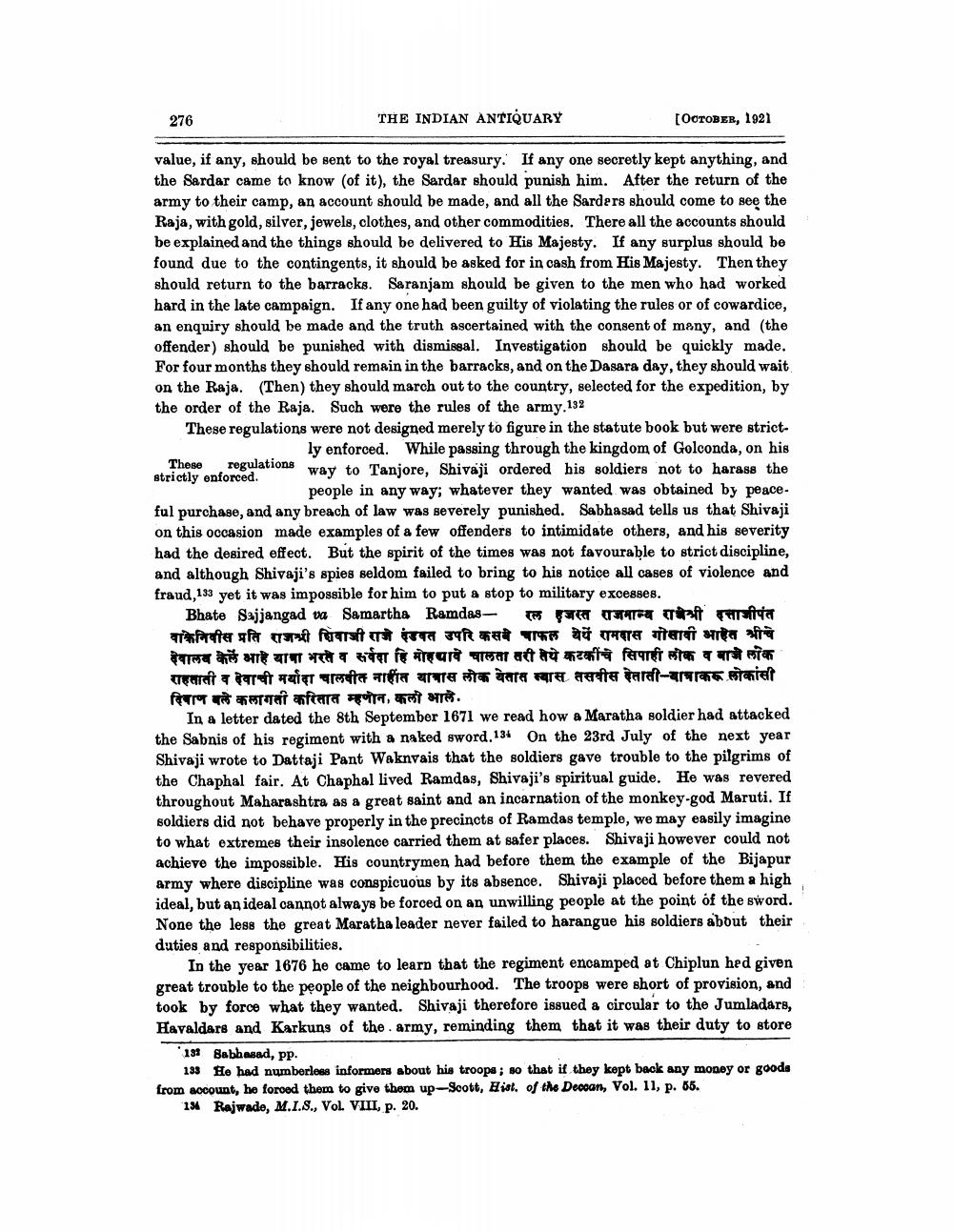________________
THE INDIAN ANTIQUARY
value, if any, should be sent to the royal treasury. If any one secretly kept anything, and the Sardar came to know (of it), the Sardar should punish him. After the return of the army to their camp, an account should be made, and all the Sarders should come to see the Raja, with gold, silver, jewels, clothes, and other commodities. There all the accounts should be explained and the things should be delivered to His Majesty. If any surplus should be found due to the contingents, it should be asked for in cash from His Majesty. Then they should return to the barracks. Saranjam should be given to the men who had worked hard in the late campaign. If any one had been guilty of violating the rules or of cowardice, an enquiry should be made and the truth ascertained with the consent of many, and (the offender) should be punished with dismissal. Investigation should be quickly made. For four months they should remain in the barracks, and on the Dasara day, they should wait on the Raja. (Then) they should march out to the country, selected for the expedition, by the order of the Raja. Such were the rules of the army.132
276
[OCTOBER, 1921
These regulations were not designed merely to figure in the statute book but were strictly enforced. While passing through the kingdom of Golconda, on his way to Tanjore, Shivaji ordered his soldiers not to harass the people in any way; whatever they wanted was obtained by peaceful purchase, and any breach of law was severely punished. Sabhasad tells us that Shivaji on this occasion made examples of a few offenders to intimidate others, and his severity had the desired effect. But the spirit of the times was not favourable to strict discipline, and although Shivaji's spies seldom failed to bring to his notice all cases of violence and fraud,133 yet it was impossible for him to put a stop to military excesses.
Bhate Sajjangad va Samartha Ramdas- रल हुजस्त राजमान्य राजेश्री दत्ताजीपंत वानिवीस प्रति राजश्री शिवाजी राजे दंडवत उपरि कसबै चाफल येथें रामदास गोसावी आहेत श्रीचे देवालय केले आहे यात्रा भरते व सर्वदा हि मोहयावे चालता तरी तेथे कटकींचे सिपाही लोक व बाजे लोक राहताती व देवाची मर्यादा चालवीत नाहींत यात्रास लोक येतास ब्यास तसवीस देताती-यात्रा करू लोकांसी दिवाण बले कलागती करितात म्हणोन, कलो आले.
These regulations strictly enforced.
In a letter dated the 8th September 1671 we read how a Maratha soldier had attacked the Sabnis of his regiment with a naked sword. 134 On the 23rd July of the next year Shivaji wrote to Dattaji Pant Waknvais that the soldiers gave trouble to the pilgrims of the Chaphal fair. At Chaphal lived Ramdas, Shivaji's spiritual guide. He was revered throughout Maharashtra as a great saint and an incarnation of the monkey-god Maruti. If soldiers did not behave properly in the precincts of Ramdas temple, we may easily imagine to what extremes their insolence carried them at safer places. Shivaji however could not achieve the impossible. His countrymen had before them the example of the Bijapur army where discipline was conspicuous by its absence. Shivaji placed before them a high ideal, but an ideal cannot always be forced on an unwilling people at the point of the sword. None the less the great Maratha leader never failed to harangue his soldiers about their duties and responsibilities.
In the year 1676 he came to learn that the regiment encamped at Chiplun hed given great trouble to the people of the neighbourhood. The troops were short of provision, and took by force what they wanted. Shivaji therefore issued a circular to the Jumladars, Havaldars and Karkuns of the army, reminding them that it was their duty to store
13 Sabhasad, pp.
133 He had numberless informers about his troops; so that if they kept back any money or goods from account, he forced them to give them up-Scott, Hist. of the Deccan, Vol. 11, p. 55.
134 Rajwade, M.I.S., Vol. VIII, p. 20.




